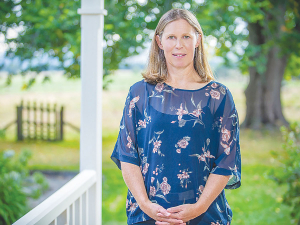Battle for milk
OPINION: Fonterra may be on the verge of selling its consumer business in New Zealand, but the co-operative is not keen on giving any ground to its competitors in the country.
 ANZ agricultural economist Susan Kilsby doesn’t expect dairy prices to rebound in the coming months.
ANZ agricultural economist Susan Kilsby doesn’t expect dairy prices to rebound in the coming months.
Analysts remain divided on the forecast farmgate milk price for the new season, starting in less than two months.
Current forecast price ranges from $7/kgMS to a bumper $10/kgMS, reflecting volatility around both supply and demand around the world.
Fonterra will announce its opening forecast milk price next month. The country's second largest milk processor Open Country Dairy is telling suppliers to expect $8.30 to $8.70/kgMS for milk supplied between June and November this year.
Westpac is forecasting a whopping $10/kgMS and is banking on prices to rise in the coming months.
The bank's senior agri economist Nathan Penny says the lift will come too late for this season.
"But it does set up 2023/24 for a bumper milk price," says Penny.
He notes that the 2023/23 season will also receive a boost from the relatively low New Zealand dollar.
ANZ isn't so optimistic, lowering its 2023-24 season forecast price by 25c to $8.50/kgMS, 25c lower than previously forecast.
ANZ agricultural economist Susan Kilsby says this is aligned with the price of next season's milk price futures contract.
Kilsby also expects the NZ dollar to impact next season's price.
"The NZD has been volatile lately in response to the uncertainty brought about by the recent instability in global finance markets, following the collapse of several overseas banks," she says.
"Dairy company foreign exchange requirements for the current season will be largely hedged now, therefore movements in the NZD will have a greater impact on next season's milk price."
Kilsby doesn't expect prices to rebound in the coming months.
"We were hoping the recent lift in demand from China would pull prices higher, but this has been offset by softer demand from other regions and increased availability of dairy products."
Global demand for dairy products was particularly weak in late 2022, when China was largely locked down to reduce the spread of Covid-19.
This resulted in demand for dairy products falling sharply at both the consumer and wholesale level within China.
China dairy import volumes fell 16% in 2022, and 2023 imports have dropped further.
Kilsby notes that when demand from China fell, more dairy products were exported into other regions such as South East Asia.
"We are now seeing a little less demand from these regions due to a build-up in their stock positions."
ASB economist Nathaniel Keall agrees that improving Chinese demand will continue to be offset by weaker dairy consumption elsewhere.
"What's more, with local production strong and dairy stocks still healthy, there's a limit to what Chinese processors will be prepared to pay for now," he says.
On the supply side, the latest data out of the EU shows milk production continuing to make tentative year-on-year improvements.
The bank is retaining its $7/kgMS milk price forecast for 2023/24.
"Not much has changed in terms of the fundamentals since our last update - with global dairy supply past its lows and softer global growth set to weigh on demand, we don't see prices mounting a dramatic comeback," says Keall.
Tickets are now available for Beef + Lamb New Zealand’s (B+LNZ) Out the Gate, returning from 19-21 May 2026 at Te Pae, Christchurch.
Dairy Women's Network (DWN) is welcoming AgriHealth as a new partner.
Northland Field Days patron Ross Newlove remembers the inaugural field days he attended 40 years ago.
Southland farmer Murray Donald has been appointed as chair of Safer Farms, the industry-led organisation focused on reducing harm, injuries and fatalities in the agricultural sector.
National Lamb Day returns this Sunday, 15 February, with Beef + Lamb New Zealand Inc calling on Kiwis to fire up their barbecues and celebrate the people and the product that put New Zealand on the world map.
When it comes to arranging the sound system at Northland Field Days, no one does it better than Colin Finlayson.
OPINION: Fonterra may be on the verge of selling its consumer business in New Zealand, but the co-operative is not…
OPINION: What does the birth rate in China have to do with stock trading? Just ask a2 Milk Company.